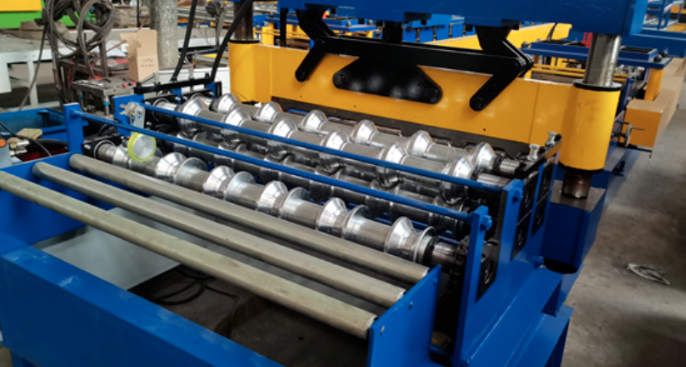A wall cladding roll forming machine is designed to produce metal wall cladding panels used in industrial, commercial, and residential buildings. These machines create various profiles like corrugated, trapezoidal, or ribbed panels, which are commonly used for external walls, ceilings, and interior applications.
Here are some features and specifications you might find in a typical wall cladding roll forming machine:
Key Features:
- Material Compatibility: Usually works with galvanized steel, aluminum, and other metal alloys.
- Customizable Profiles: Machines can be designed to produce a variety of panel designs and sizes based on your project requirements.
- Automatic Operation: Machines can be fully automated with hydraulic cutting systems, leveling, and punching features.
- Speed and Efficiency: High-speed roll forming systems allow for efficient production.
- Precision: Precision forming with accurate cutting ensures that the panels meet exact dimensions and design criteria.
Types of Wall Cladding Panels:
- Corrugated Wall Panels: Often used in agricultural and industrial buildings.
- Trapezoidal Panels: Popular for commercial buildings, offering strength and durability.
- Ribbed Panels: Provide a more modern aesthetic and are commonly used in architectural projects.
- Insulated Cladding Panels: For buildings that require thermal insulation.
Common Applications:
- Exterior wall cladding for commercial, industrial, and residential buildings.
- Interior panels for ceilings, partition walls, or decorative use.
- Facades to improve the aesthetic appearance and protection of a building.
Wall cladding profiles
Wall cladding profiles come in a variety of designs to suit different architectural styles and functional needs. Each profile offers unique advantages in terms of aesthetics, durability, and weather resistance. Below are some of the most common types of wall cladding profiles used in metal construction:
1. Corrugated Wall Panels
- Profile: Wavy, sinusoidal design.
- Applications: Widely used in industrial, agricultural, and commercial buildings.
- Advantages: Lightweight, durable, and cost-effective. Provides an industrial look while offering high strength-to-weight ratio.
2. Trapezoidal (Box) Profiles
- Profile: Box-like ridges, angular design with larger flat areas between ribs.
- Applications: Suitable for commercial, industrial, and modern residential buildings.
- Advantages: Higher strength compared to corrugated panels, good for load-bearing walls and roofs.
3. Ribbed Wall Panels
- Profile: Features vertical ribs with wider flat areas in between.
- Applications: Popular for architectural facades and modern designs.
- Advantages: Offers a sleek, contemporary appearance, often used for aesthetic purposes in addition to functionality.
4. Standing Seam Wall Panels
- Profile: Seamless appearance with concealed fasteners, vertical seams.
- Applications: Often used in high-end residential and commercial buildings.
- Advantages: Highly weatherproof, excellent for creating clean, uninterrupted lines. Ideal for both roofs and walls.
5. Interlocking Panels
- Profile: Panels that interlock with each other, providing smooth, flat surfaces.
- Applications: Architectural and modern commercial buildings.
- Advantages: Concealed fasteners, modern aesthetics, often used for rainscreen systems.
6. Flush Wall Panels
- Profile: Flat surface without any visible seams or fasteners.
- Applications: Interior or exterior cladding where a smooth, modern look is desired.
- Advantages: Clean lines, often used in high-end commercial or residential construction for a minimalist appearance.
7. Insulated Metal Panels (IMP)
- Profile: Sandwich panels with foam or other insulation materials in between two metal layers.
- Applications: Used for energy-efficient building designs, both in walls and roofs.
- Advantages: Excellent thermal insulation, easy to install, reduces energy costs.
8. Weatherboard (Shiplap) Profiles
- Profile: Horizontal or vertical panels that overlap each other slightly.
- Applications: Used in both modern and traditional architecture.
- Advantages: Provides a neat and seamless appearance, with good weather protection.
9. Tile Effect Panels
- Profile: Metal panels shaped to look like traditional tiles.
- Applications: Used in residential and commercial projects where a tile appearance is desired.
- Advantages: Combines the aesthetic of tiles with the durability and lightness of metal.
10. Louvered Panels
- Profile: Panels with angled slats for ventilation purposes.
- Applications: Often used in industrial and utility buildings where airflow is needed.
- Advantages: Allows for air circulation while providing weather protection.
These profiles can be produced in a wide range of materials including galvanized steel, aluminum, stainless steel, and pre-painted metals, depending on the specific project requirements.
Machine matcher specialise in matching your roll forming machine requirements with the perfect new or pre owned machine.
We partner with, and represent some of the finest roll forming manufacturers in the market. For more information and a free machine quote please contact us today or view all machines.




